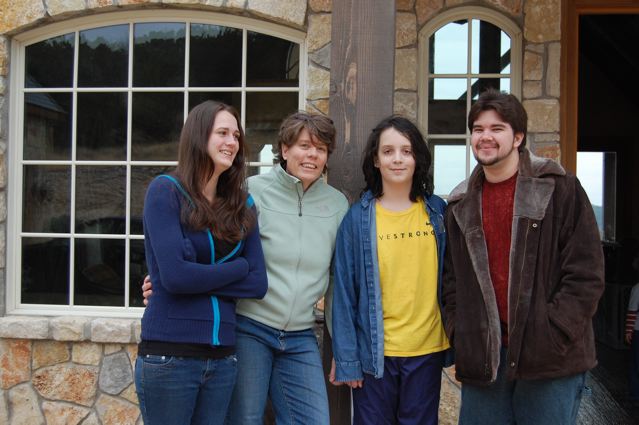
"Yes, it's perfectly fine for you to use my name and picture. Unless I'm doing something wildly illegal, it's always okay. However, if I'm doing something that is wildly illegal AND awesome, I insist it be posted."This is the photo mentioned above:

People with younger kids who "are not writing," think again. Are they joking with you and others? When they ask questions, do they think a bit so they can word the question clearly? Are they starting to choose one word over another, for some dramatic or emotional or humorous or feelings-sparing reason? Writers need to do those things.
When they answer questions about a movie they've seen, do they take their audience into consideration? Who wants the short version, and who wants the long one? Who would rather hear about the characters than the action sequence? Writers need to think of those things.
Marty (at 25) on facebook at the end of the long day when the clutch had gone out on his Jeep when he was by himself and 300 miles from home:
I left the clean-up before 7am this morning didn't make it home till about 9pm. But thanks to good people in my life, I came home to dinner, love, and dessert. Also my car isn't in Trinidad.(He and a few dozen others had been moving brush and pulling cactus on some private land in Colorado, to get it ready for a week-long campout—voluntarily, for free, paid their own way, used their own tools... but Keith and I paid for the clutch replacement. He's talking about Colorado's Trinidad, not the West Indies, though he is going to Puerto Rico for his honeymoon in November.)
Thanks for all the help.
I only freaked out a little.
That's not poetry. It's not fancy writing. But it showed safety (to those who wondered if he had ever made it home), gratitude, and humor.
Writers need to know how to express those things.
Holly, on Twitter, in her profile, says
Beware: Candor aheadThat is word artistry. Sparse. Rhythmic. Informative.
One tweet was: "Contemplating purpose of and reasons for clothes. #InMyOwnWorld" She's not going to think those things without calling on what she knows of history, geography, religion and culture. And she used the prepositions well.
The next tweet was grammatically low-brow:
"Picked myself out a tacky Target shirt #swag"Then there was a photo of just enough of the Jurrasic Park crop top with the rainbowy-reflective dinosaur logo.
"Contemplating the purpose of clothes" got formal grammar.
Tacky swag from Target got "proper" informal grammar.
Writers need to know the difference.
I wanted to bring those things all into one place to remind people that what writing needs is a large range of things that begin and expand outside of and away from "paper" or writing of any sort. A familiarity with the range of the language, of voice and tone (without knowing those words, it's easy), of funny words, scary words, plain and fancy words. That comes from listening to comedy, watching award-winning films, and YouTube videos, reading (or hearing someone read) comics, artsy menus, advertisements, legal notices, warning signs, brass plaques on government buildings. Tweets. Posts on yahoogroups or facebook. Post cards. Business letters and birthday cards.
Writing is thinking clearly. For unschoolers writing will be helped by a kid having the confidence that if someone asks him about a movie or the lyrics of a song, that person will listen to his report, and to his opinion, and if he's misheard the words or misunderstood the plot, that they will help him understand it.
Please feel free to add what I might have forgotten that will help a child become an adult who writes. I'll put this somewhere "out there" (more easily found) when I like it. If you have samples and stories of your kids' writing, please share.
Sandra
Sharing a little sample of writing from my 10 year old daughter. This was done in the middle of playing with her younger sister! What matters to me is that it looks like she relished every drop of ink and every letter formed doing this. I know that because there was a reason for her writing it out. It was part of the game, it meant something to them at the time 🙂
Some words may not be spelled correctly but that does not matter to me, we talk about how words are spelled comparing them to how they sound and that there are many contradictions. That's fun. I like that we enjoy the occasional chat and dissect the English language. We unearth old language fashions from history and this leads onto so many other subjects.
Hi. I'm a long-time reader who never posts, but I was struck by Sandra's words about learning to write and wanted to share my thoughts and experience with this. I think it is very important to recognize that learning to write is about so much more than putting words on paper, and that a child who rarely picks up a pen may in fact still be learning to write.My son went to kindergarten and didn't like it at all. He especially did not like been pushed to read aloud and being pushed to write (mostly repetitive worksheets to practice writing letters). We pulled out of school when he was six. I could see that the pressure had made him resistant to both reading aloud and writing while in school, and I very much did not want to replicate this at home, or have homeschooling negatively affect our relationship.
So I read a lot and when we left school, we eased into unschooling—and spent the next couple of years doing all kinds of fun things. Lots of science experiments and building projects. I read to him tons. We talked a lot. He very rarely picked up a pen. It was a full year before he started spontaneously reading things aloud to me ("hey, listen to this! Calvin and Hobbes were... etc etc").
I could see that he was happy and confident and curious and learning all the time, and so I didn't really doubt that we were doing the right thing for him and our family- but writing was the one thing I felt twitchy about. I'd find myself worrying about the fact that he never wrote at all—probably because I had taken on some of the messages from the school about him needing to practice it. I hadn't really understood that writing well is largely about thinking clearly (some irony here, in that I am a writer and teach creative writing courses for adults!) But I had seen the damage done by the school pushing him, so when I got twitchy I bit my tongue a lot, and read more, and I talked to unschoolers with older kids—which helped enormously.
A couple of years ago, when he was eight, my son got into gaming and Minecraft—which meant he started typing. And almost immediately he began writing- made a website, commented on people's YouTube videos and forums, started his own YouTube channel, began writing backstory for Minecraft adventure maps he was making, etc etc. He has always had an organized and logical way of thinking, a love for words and huge vocabulary, and this all showed in his writing. And—perhaps because of all the reading and conversation—he already had a great understanding of tone, voice, and of writing for a particular purpose and a particular audience.
Accurate spelling followed quickly, because he wanted to present himself well online and it mattered to him to spell correctly. More recently, he focused on punctuation and started paying attention to commas, capitalization etc. Now, at ten, he writes very well indeed. (He still never picks up a pen, but I no longer worry about that.) When we read novels together, his observations and comments about the books (author's style, use of description, character development, strengths and weaknesses, etc.) show me very clearly that he is noticing and learning things that will further inform any writing he chooses to do.
I was amazed by how much of the process of learning to write, in our experience, had very little to do with actually putting words on paper. Like reading, it just seemed to happen spontaneously and almost magically- but of course, the learning had been happening for a long time and just wasn't visible. Or rather, it probably was—I was just not seeing it because it didn't look the way I expected it to.
Anyway, thanks for that thought-provoking post Sandra. I look forward to reading other people's observations.
Robin Stevenson
p.s. I LOVE Holly's words: "Beware: Candor Ahead". Very nicely put, and it made me laugh.
Martin Dodd:
Martin Dodd:
Marty's all grown (28), and a Junior (third year of four) at the University of New Mexico, studying economics and geography as of that writing (February 18, 2017).
Kirby's commentary on the casting of the upcoming Ninja Turtle movie is linked below. We supported his Ninja Turtle obsession from the time he was two years old. His writing shows affection and a deep understanding, 25+ years later.
Gina Trujillo (my niece, who writes and draws) inspired one of my kids to write. She posted this image on facebook and within the string of responses, my son Marty (her cousin) came in with some good logic and a clever thought. This is all brought here because of the last phrase about "chill."

The part i keep getting stuck on is the two on seven part. any team that doesn't have Batman will get out smarted and any team that is lucky enough to be in the dark knights graces gets run over by sheer force.
is it against the rules to just play devil's advocate?
Okay real answer! The Hulk has the fewest weaknesses against these fools, so he's my main man, and he needs someone to really piss him off while the fights going so i need Antman (I've decided it's Eric O'Grady) to tell him to "Chill out bro", which we all know is the trigger phrase which makes no bro chill.
Marty's "writing technicalities" could be tweaked, but if you read that last part aloud, it's quite poetic. So the writing isn't perfectly formal, but it was on Facebook to his cousin, and not a paper for a professor. More importantly, in context, it is fluid and amusing.
Me, reviewing Kirby's review, April 2, 2014:
I love these phrases: "Can he be the calm and collected leader we love? Will he be able to display true remorse during the darkest hour of the story?" and "I truly hope that he can capture the softer side of Raphael, his deep sense of loyalty, passion, and irrationally swift justice."
I just like the whole thing. And it reminds me, again, that from his youngest years he could identify voice actors in unrelated places. 🙂
(Warning: TL;DR possible)
(Kirby was 27, when he wrote that.)
What do you mean by "writing"?

Unschooled Kids' First Formal Writing

Cursive writing

Small Words—poetry and lyrics

Small Words in Prose